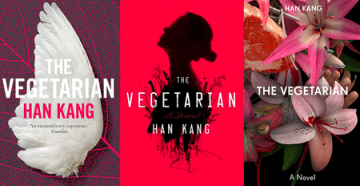
Disclaimer: This article has minor spoilers.
“The Vegetarian” written by Han Kang and released in 2015, South Korea, is a modern feminist novel with the objective to raise concerns regarding the patriarchal oppression women face in South Korea. It is based on another book titled, “The Fruit of My Woman,” by the same author. This odd yet fascinating title first hooked my attention; how is vegetarianism related to feminism?
Set in modern-day South Korea, “The Vegetarian” revolves around a single voiceless protagonist named Young-Hye, who is described and discussed by 3 central figures in 3 different parts of the novel, respectively. Young-Hye is born in a classic, conservative Korean family: her father is dominant over the entire family’s decisions and the women of her family, her mom and her sister In-Hye, stay mainly in the kitchen. After she marries her husband, Mr. Cheong, she quits her job and serves her husband, and lives a mediocre life, until her nightmare that haunts her every day. This nightmare, which the readers only receive glimpses of, converts Young-Hye into a voiceless vegetarian, who cannot even stand the smell of flesh, blood, and meat.
The first part, narrated by Mr. Cheong, introduces Young-Hye’s journey as a vegetarian. This part is also the chapter where Young-Hye faces the most patriarchal discrimination, starting from her husband who forces her to wear bras and makeup, to her husband’s colleagues who satirically compliment her for being quiet and obedient, like women in the old times.
The second part, named “The Mongolian Mark” revolves around Young-Hye’s brother-in-law, who remains nameless throughout the novel. He sexually fantasizes Young-Hye for her Mongolian birthmark and ends up sexually harassing and raping the unconscious victim. The brother-in-law exploits Young-Hye’s unwillingness to protest, after she converts into a vegetarian, and takes advantage of her body to satisfy his own sexual needs.
In the third part, where Young-Hye’s sister, In-Hye is in charge, the protagonist is now home from the mental-health facility she was forced into along with her brother-in-law but remains to be completely anorexic and silent. At this point, In-Hye is the only one who still cares about Young-Hye’s well-being but is restricted as she is a working, single mother. The entire novel ends with In-Hye confused whether we should succumb to social standards, or to express our deepest desires and impulses.
By just reading the short summaries listed above, you are probably confused as to how this novel connects with feminism and the patriarchal societies that still harm women today. To keep it short, this novel vaguely explores whether as humans, we should suppress our individual needs and desires to fit into a social category. The protagonist, Young-Hye, tackles social expectations by converting into a vegetarian, which even her family disagrees and threatens to. The brother-in-law releases his inhumane, unethical desires and eventually rapes his sister-in-law. Though these two figures all end up facing devastating consequences, such as Young-Hye becoming lunatic and the brother-in-law being forced into a mental facility, In-Hye ends up being ironically jealous of them.
Jealousy is an important symbol, in my mind, of feminism in modern South Korean society. Bystanders are jealous of “feminists” and activists who stand up for their own rights because they cannot actively participate or “side” with them because they are afraid of the consequences of expressing their voices. In-Hye could not help Young-Hye when she was being physically abused into eating meat because she was afraid of her father abusing her as well.
With almost all male characters portrayed negatively, it was expected for the male demographic in South Korea to react hatefully to this novel. But in my opinion, this book is not about men. This novel is criticizing the patriarchy that still exists in modern society and is exposing the bystanders who fail to save the victims of the oppression.
In many ways, vegetarianism is similar to feminism in modern South Korean society. Animals are oppressed by humans in farms and zoos, just like women in patriarchal cultures. Vegetarianism is frowned upon by many, with vegans commented as anorexic and mentally ill, much like the feminists who are stigmatized into anti-male sentiment members called “WOMAD.”
Overall, I definitely encourage all of you to read this book. This book explores the various aspects of feminism in South Korea today uncensored, which is another reason why I was so intrigued while reading. Comment below your reaction to this book, if you have read it already!